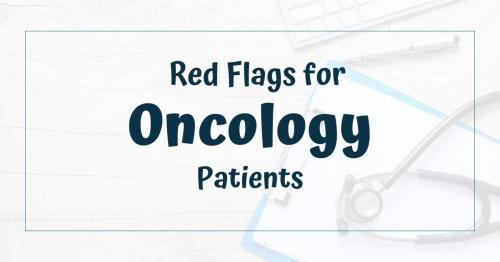What are the Red Flags for Oncology patients?

In oncology, "red flags" refer to symptoms or signs that could indicate a significant problem or a worsening of the patient's condition. Recognizing these red flags is crucial for timely intervention and appropriate management. This comprehensive guide outlines key red flags that oncology patients, their families, and healthcare providers should be aware of.
Understanding Red Flags in Oncology
Importance of Awareness: Early recognition of red flags can lead to prompt medical evaluation and intervention, which is critical in oncology care.
Role of Healthcare Providers and Patients: Both healthcare providers and patients play a vital role in identifying and responding to these warning signs.
New or Worsening Pain
Unexplained Pain: New onset or significant worsening of pain, especially if it's persistent or progressive, can be a red flag. It might indicate cancer progression, metastasis, or complications like bone fractures.
Character of Pain: Attention should be given to the nature of the pain - its intensity, duration, and triggers.
Unexplained Weight Loss
Significant Weight Loss: Losing a substantial amount of weight without trying can be a sign of cancer progression or a serious side effect of cancer treatment.
Nutritional Concerns: It also raises concerns about nutritional deficiencies that can impact the patient's overall health and ability to withstand treatment.
Changes in Neurological Function
Symptoms to Watch: Sudden changes in neurological function, including confusion, difficulty speaking, changes in vision, weakness, or numbness, can be red flags for complications such as brain metastases or stroke.
Impact on Quality of Life: These symptoms can significantly impact a patient's quality of life and may require immediate medical attention.
Shortness of Breath or Difficulty Breathing
Respiratory Issues: This can indicate lung involvement, either by the cancer itself or by fluid accumulation around the lungs (pleural effusion).
Risk of Pulmonary Embolism: In cancer patients, there's also an increased risk of pulmonary embolism, a potentially life-threatening condition.
Persistent or High Fever
Infection Risk: Cancer patients, especially those undergoing chemotherapy, are at a higher risk of infections. A persistent or high fever can be a sign of an infection that needs prompt treatment.
Monitoring: Regular temperature monitoring is often recommended for patients undergoing certain types of cancer treatments.
Sudden or Severe Bleeding
Causes: This can be caused by low platelet counts (a side effect of some cancer treatments), certain types of cancers, or the rupture of a blood vessel.
Immediate Attention Required: Any sudden or severe bleeding warrants immediate medical attention.
Frequent or Severe Nausea and Vomiting
Impact on Treatment: Persistent nausea and vomiting can hinder a patient's ability to maintain nutrition and adhere to treatment regimens.
Risk of Dehydration: It also increases the risk of dehydration and electrolyte imbalance.
Swelling or Lymphedema
Indication of Blockage: Swelling, particularly in the limbs, can indicate lymphatic system blockage due to cancer or as a side effect of treatment (like surgery or radiation).
Management Strategies: Lymphedema can be managed with physical therapy and compression, but it requires early intervention.
Skin Changes or Wound Healing Issues
Signs of Skin Cancer: New or changing skin lesions can be a sign of skin cancer, including melanoma, especially in patients with a history of skin cancer.
Delayed Healing: Slow healing of wounds can be a red flag, particularly in patients receiving radiation therapy.
Conclusion
Recognizing red flags in oncology is crucial for ensuring timely medical intervention and optimal management of the patient’s condition. Patients and caregivers should be educated about these signs and encouraged to report them promptly to healthcare providers by visiting the Best Oncologist in Hyderabad. Ongoing communication and regular monitoring are key to addressing these concerns effectively and maintaining the best possible quality of life for oncology patients.
Post Your Ad Here
Comments